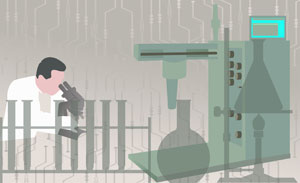BERKELEY, CA (UroToday.com) - With advent of novel therapies for advanced prostate cancer, it became important to improve the understanding of mechanisms relevant to failure of endocrine and chemotherapy. New medications which are currently being used in prostate cancer either inhibit intracrine androgen synthesis (abiraterone acetate) or prevent androgen receptor (AR) translocation (MDV 3100). What about other players in the androgen signaling pathway?
 There are a number of studies on AR coactivators, and clinically relevant cofactors have been identified. Importantly, up-regulation of a coactivator during endocrine therapy is a significant finding. Good examples are p300 and CBP cofactors, which are suppressed by androgen, and their expression increases during endocrine therapy. Therefore, it would be of great interest to examine how these proteins are regulated during therapy with the novel pharmaceutical agents mentioned above. This issue is particularly important because p300 is required for a ligand-independent activation of the AR and may maintain the expression of its target genes in conditions in which there is a low expression of the AR. The authors´ laboratory is focused also on the development of experimental therapies with the aim to diminish p300 functional activity in prostate cancer cells. With two different approaches, siRNA and a small molecule targeting the p300 acetyltransferase domain, it was seen that p300 has numerous functions in regulation of proliferation, apoptosis, migration, and invasion, and they are not solely dependent on AR presence. Similarly, Tip60 is up-regulated in prostate cancer progression in part also as a consequence of androgen deprivation. An appropriate approach in the era of personalized medicine may be detection of highly expressed coactivators in primary tumors and metastases, which could be targeted by small molecules or other experimental therapies. These therapies may either inhibit the cofactor expression or diminish its interaction with the receptor. In terms of coactivator diversity, it is important to mention that SRC-3 strongly interacts with the signaling pathway of insulin-like growth factor-I thus leading to stimulation of phosphorylated Akt and inhibition of apoptosis.
There are a number of studies on AR coactivators, and clinically relevant cofactors have been identified. Importantly, up-regulation of a coactivator during endocrine therapy is a significant finding. Good examples are p300 and CBP cofactors, which are suppressed by androgen, and their expression increases during endocrine therapy. Therefore, it would be of great interest to examine how these proteins are regulated during therapy with the novel pharmaceutical agents mentioned above. This issue is particularly important because p300 is required for a ligand-independent activation of the AR and may maintain the expression of its target genes in conditions in which there is a low expression of the AR. The authors´ laboratory is focused also on the development of experimental therapies with the aim to diminish p300 functional activity in prostate cancer cells. With two different approaches, siRNA and a small molecule targeting the p300 acetyltransferase domain, it was seen that p300 has numerous functions in regulation of proliferation, apoptosis, migration, and invasion, and they are not solely dependent on AR presence. Similarly, Tip60 is up-regulated in prostate cancer progression in part also as a consequence of androgen deprivation. An appropriate approach in the era of personalized medicine may be detection of highly expressed coactivators in primary tumors and metastases, which could be targeted by small molecules or other experimental therapies. These therapies may either inhibit the cofactor expression or diminish its interaction with the receptor. In terms of coactivator diversity, it is important to mention that SRC-3 strongly interacts with the signaling pathway of insulin-like growth factor-I thus leading to stimulation of phosphorylated Akt and inhibition of apoptosis.
Although AR coactivators are not considered specific to the AR only, and are known to interact with other steroid receptors and proteins, they are implicated in a number of signaling pathways, thus contributing to tumor progression.
One of the most important take-home messages from this article is that targeting cofactors in order to diminish AR activation could be a novel therapeutic approach, however research on this topic is still in its infancy.
Written by:
Zoran Culig and Frédéric R. Santer as part of Beyond the Abstract on UroToday.com. This initiative offers a method of publishing for the professional urology community. Authors are given an opportunity to expand on the circumstances, limitations etc... of their research by referencing the published abstract.
Experimental Urology, Department of Urology, Innsbruck Medical University
Correspondence: or
Androgen receptor co-activators in the regulation of cellular events in prostate cancer - Abstract



